December 24, 2105
BURLINGTON, ON
How many will there be? We have no idea, said Gillian Kearns, interim director at the Wesley Urban Ministries in Hamilton, one of the re-settlement points for those people who have been sponsored by the federal government.
We are gearing up to get ourselves to the point where we have 150 places we can house people – which we figure will allow us to handle up to 450 of these newly minted Canadians who have come to us from the war torn Middle East.
There are currently 17 people at the Wesley office in Hamilton where there are 36 rooms in what was once a senior’s home.
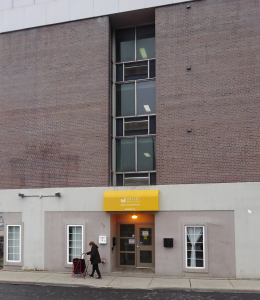
Once a Seniors’ residence this Catherine street building in Hamilton is where the bus with new Canadians stops and where the process of re-settling people from the Middle East begins.
This is the first intake point and where we begin the process of orienting them to life in Canada, said Kearns who has been working with Wesley Urban Ministries (WUM), for three years, an organization that has been around for more than 60 years. We help them open up their bank accounts, get them used to transit in Hamilton and walk through Jackson Square with them.
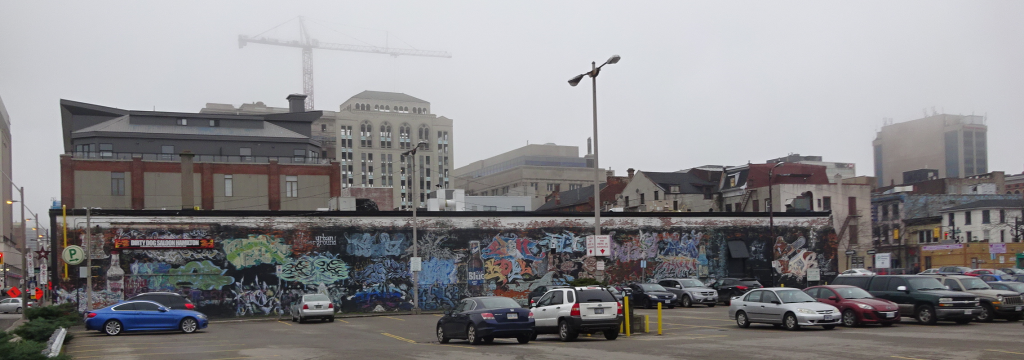
A parking lot with graffiti all over the walls of a building across the street from the Wesley Urban Ministry offices is what greets the new Canadians who arrived last week – no grass and not a tree in sight – but the rooms are warm and the food is good.
Wesley Urban Ministries is right in the middle of that part of town where there aren’t’ a lot of trees and the closest park is a couple of blocks away. One has to look hard to see any grass. An abandoned bus terminal is steps away from the entrance to the WUM door and a parking lot across the street with some very impressive graffiti. You’ll never see anything like that in Burlington – over here we call it public art and pay artists a pretty penny to put it in place.
Wesley is now in the throes of hiring intake case workers – there were four and now there are ten; just about everything else has scaled up at the same rate explains Kearns.
Kearn’s doesn’t know if any of the government supported new Canadians will get to Burlington. “The biggest issue is the cost of housing – the funds these resettled people get can barely pay for housing in Hamilton and as everyone knows housing in Burlington is much higher.
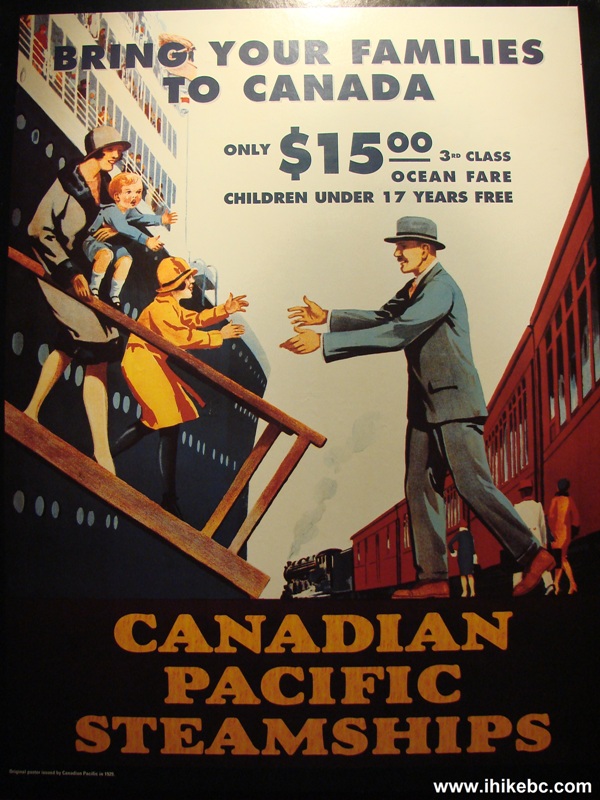
Canada has grown to a significant degree from immigration – there was a time when the railways and steamship companies advertised for immigrants. This poster is part of the story told when times were very different.
Those that get to live in Burlington will be part of the group that came into the country as private sponsorships – there is no link between the government sponsorships and those that are privately sponsored.
There are about 20 groups in Burlington that are working on private sponsorships.
Individuals and faith groups have banded together to support families – to do so the group has to show that is has $30,000 committed to supporting the family for a year. We don’t know at this point what kind of oversight there is for these private sponsorships.
We do know that the rest of the world marvels that Canadians pull together and help these people financially, emotionally – they almost adopt them.
Canada has brought in around 7,000 immigrants each year with about 300 of them starting their lives in Hamilton, so we have quite a bit of experience explains Kearns – this wave however is made up of people who had to make decisions very quickly and they left conditions that were pretty miserable.
Of the 25,000 the federal government has said will come to Canada about 10,000 will be private sponsorships.
Wesley has an offsite kitchen that prepares meals for several of the Wesley operations. Their chefs know how to prepare the diet Middle Eastern people want.
Each day begins with breakfast which the immigrants prepare for themselves in the small kitchen in the building, the other meals are brought in.
The first group haven’t been here a week yet and we don’t know when the next group is going to arrive. The general public know about as much as we do. When the aircraft land in Toronto or Montreal decisions are made at that end as to where people are going to be sent. We get a call telling us that a bus is on the way with a certain number of people and we take it from there.
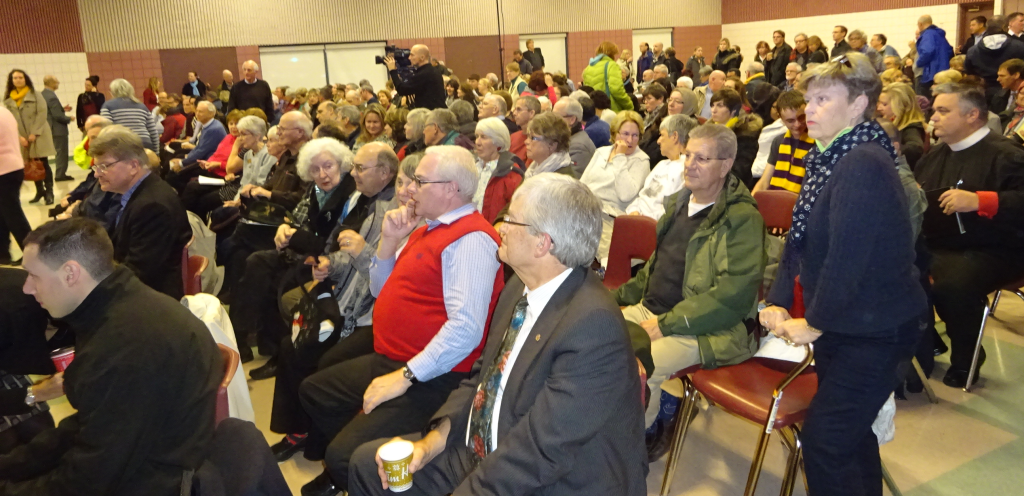
Hundreds of Burlingtonians gathered at a public meeting early in December to learn what they could do to support immigrants who were about to arrive in Canada.
We have no idea what is coming our way and the people on the bus know very little about where they are going – just that they are now safe, that the sheets on the bed are clean and they have a future to look forward to in a country that has welcomed them.
The hardest part of the task for the people doing the day to day work is always being “brain tired”. The problems just keep rolling in. Our case workers explained Kearns hear stories that are horrifying every day – we have to ensure that both our case workers and the people they are helping get the support they need as they do what is difficult work.
We create a profile for each immigrant so that we can figure out what they need to learn in terms of life skills; what they have in terms of work experience and education. They are in our care for as much as a year. The objective is to get them started and let them figure out what they want to do – they can basically go anywhere they want. They are permanent residents of Canada and in five years they can become citizens.
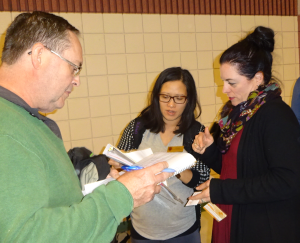
Gillian Kearns, on the right, exchanges information with Burlingtonians at a public meeting early in December. She works with a team of people at the Wesley Urban Ministries helping the immigrants that have arrived re-settle themselves.
Our job is to know as much as possible about each person so we can help them resettle themselves. We bring in people to do a full medical checkup – we look for signs of serious emotional stress and guide people who have come from half way around the world to a place they knew very little about adjust. The work is exciting Kearns added but there is just so much to do.
Clothing for everyone; answering the questions they have and helping them keep in touch with those they left behind. Getting the children into school and ensuring they can adapt.
At a time of year when the rest of us are celebrating a major cultural and religious event, at a time when we usually have snow, we too have to adapt to a change and at the same time help those in our care adapt to the massive change in their lives.
It is exhilarating and at the same time it is tiring, adds Kearns – but if we get it right we will have brought to this country people who will add to what we are – a caring, giving people who made a place for them in this world.
There is a small reception office on the ground floor of the Wesley Urban Ministry on Catherine Street where a cheerful well informed woman answers the phone and keeps in touch with staff. From time to time someone will quietly walk in and place an envelope on the counter. The receptionist smiles and asks – “would you like a receipt?” No – you can mail it, thank you.
That’s the way it works in this country.

















Yes, well written Pepper. Really, it’s all going to boil down to two items: decent housing and full-time, well-paying jobs, both very elusive. New Canadians in the past could count on both. Not so any more.
Yes, an inspiring and well written article. Highlights the upside as well as the hard work ahead.
Great piece Pepper!
You show heart, and our collective.